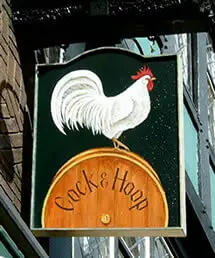In a state of exuberant elation.
Cock-a-hoop
What's the meaning of the phrase 'Cock-a-hoop'?
What's the origin of the phrase 'Cock-a-hoop'?
First, a health warning. If you are hoping to find a straightforward explanation of the origin of the term ‘cock-a-hoop’ here you will be disappointed. The expression has one of the most Byzantine etymologies of all the phrases in English. If you aren’t daunted by that caveat, read on…
The belief in false word and phrase origins, otherwise known as folk-etymology, relies on someone coming up with a hypothesis about the origin of an expression that appears plausible. If enough people believe the theory it will be circulated and enter the group consciousness (see the ludicrous but apparently immortal Life in the 1500s for examples of such tales). Until recently, we had to rely on tour guides to invent and distribute such stories, now we have legions of the Internet. ‘Cock-a-hoop’ is unique in my experience in that its origin has been clouded by the intervention of two pieces of 17th century guesswork. The lexicographer Thomas Blount wrote a dictionary titled Glossographia and the 1670 edition of the work included a speculation on the source of ‘Cock-on-hoop’:
Our Ancestors call’d that the Cock which we call a Spigget, or perhaps they used such Cocks in their vessels, as are still retained in water-pipes; the Cock being taken out, and laid on the hoop of the vessel, they used to drink up the ale as it ran out without intermission and then they were Cock-on-Hoop , that is, at the height of mirth and jollity; a saying still retained’.
This view was probably derived from early texts, like John Palsgrave’s 1540 translation of the Latin text The Comedye of Acolastus:
“Let us sette the cocke on the hope and make good chere within doores.”
Plausible indeed, but we don’t really know what ‘cocke’ or ‘hope’ (hoop) Palsgrave was referring to – the OED has numerous meanings for both words. The problem with Blount’s account is that he simply asserts it to be fact, without offering any evidence. People believed it – he was a lexicographer after all – and that casts doubt on the usefulness as evidence of any use of the phrase post 1670, as they are just repetitions of popular belief rather than of fact. Had Blount been a little more methodical, he would have assembled all of the plausible theories and looked for evidence. One possible origin that he ignored was the pub signs that show a cock and a hoop, which have existed since at least the 14th century – long pre-dating his theory. The Clause Roll of Edward III, circa 1335, lists many pub names that include ‘hoop’, including ‘the Hen on the Hoop’ and ‘The Cock on the Hoop’. Some of these pubs still exist. Another theory was that the expression was a translation of the French ‘coc-a-huppe’. This was suggested by Edward Phillips, a rival of Blunt’s, in the dictionary New World of Words, 1678:
Cock-a-hoop (French coc-a-huppe, a Cock with a Crest). All upon the Spur, high in mirth, or standing upon high terms.
For good measure, Phillips also repeated Blount’s theory that ‘cock-a-hoop’ derived from “the Staffordshire custom of laying the Cock or Spigot upon the Barrel, for the company to drink without intermission”, which tends to undermine one’s confidence in him. Blount clearly wasn’t impressed and went to the trouble of publishing A World of Errors Discovered in the ‘New World of Words’.
Whether the original meaning of ‘cock-a-hoop’ was ‘turn on the taps, let the liquor flow and cast off all restraint’ or ‘stand on the barrel and crow with exaltation’ (or something else entirely) we aren’t ever likely to now know. Suffice it to say, if you come up with and publish a theory of your own, someone will believe it.
See also: the meaning and origin of ‘cock a snook‘.
The history of “Cock – a – hoop” in printed materials
Trend of cock – a – hoop in printed material over time
Related phrases and meanings
Browse more Phrases
About the Author

Phrases & Meanings
A-Z
A B C D E F G H I J K L M N O P Q R S T UV W XYZ
Categories
American Animals Australian Bible Body Colour Conflict Death Devil Dogs Emotions Euphemism Family Fashion Food French Horses ‘Jack’ Luck Money Military Music Names Nature Nautical Numbers Politics Religion Shakespeare Stupidity Entertainment Weather Women Work
How did we do?
Have you spotted something that needs updated on this page? We review all feedback we receive to ensure that we provide the most accurate and up to date information on phrases.
